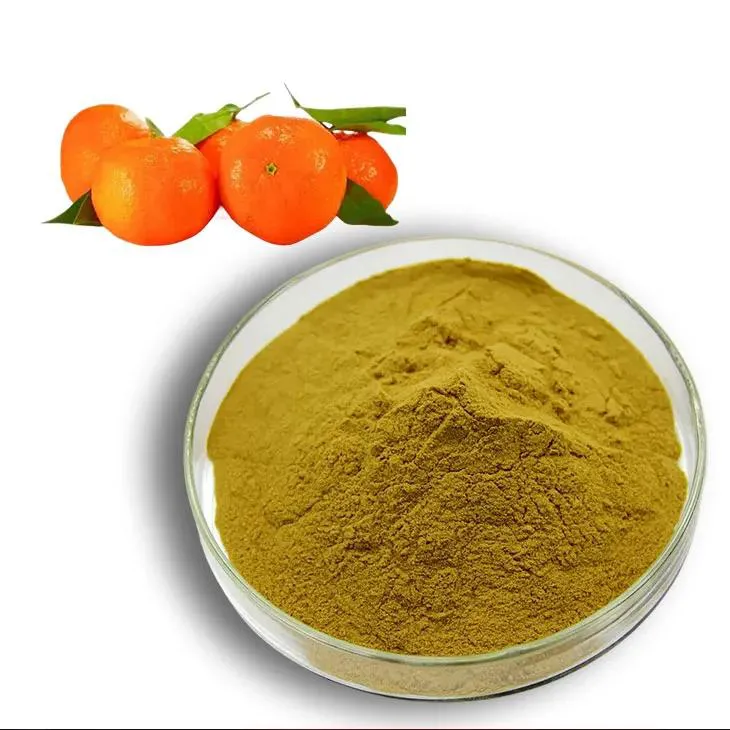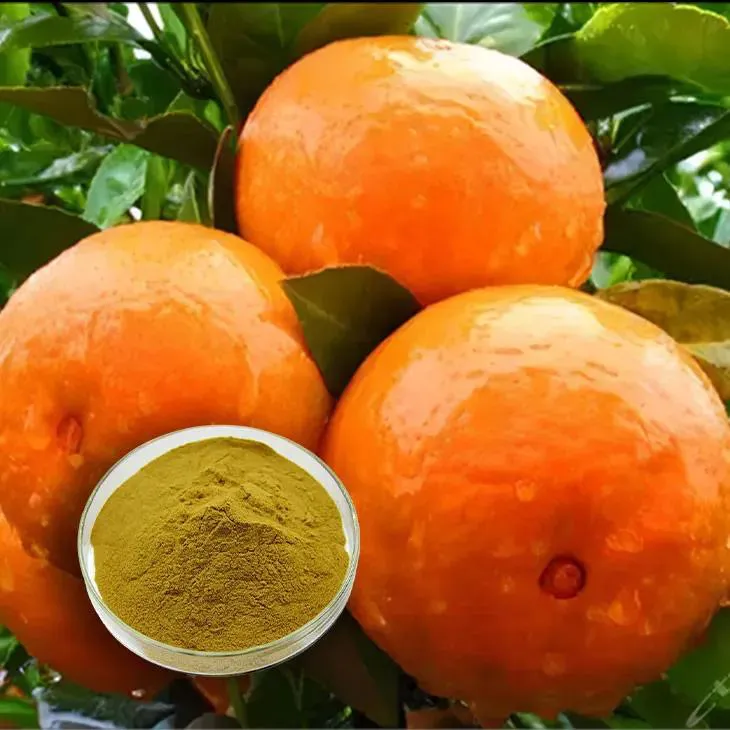- 0086-571-85302990
- sales@greenskybio.com
Five Reasons for Using Citrus Bioflavonoids in the Food Industry.
2024-12-14

1. Antioxidant Capacity
Citrus bioflavonoids possess remarkable antioxidant capacity, which is a crucial factor in the food industry. Oxidation is a natural process that can have detrimental effects on food. It can lead to the spoilage of food, causing changes in taste, smell, and texture. By adding Citrus bioflavonoids to food products, manufacturers can effectively safeguard food freshness and extend storage time.
Antioxidants work by neutralizing free radicals. Free radicals are highly reactive molecules that are formed during normal metabolic processes in the body as well as during the storage and processing of food. These free radicals can react with other molecules in food, such as fats, proteins, and carbohydrates, leading to the breakdown of these molecules and ultimately the spoilage of food. Citrus bioflavonoids are able to donate electrons to these free radicals, thereby stabilizing them and preventing them from causing further damage.
For example, in the case of fatty foods, oxidation can cause rancidity. This not only affects the taste of the food but also reduces its nutritional value. The antioxidant properties of citrus bioflavonoids can prevent this rancidity, allowing fatty foods to remain fresh for a longer period. In addition, in products such as fruits and vegetables, which are rich in nutrients but are also highly perishable, the addition of citrus bioflavonoids can slow down the oxidative processes, maintaining their freshness and nutritional integrity.

2. Distinct Flavor Profile
Another significant reason for using citrus bioflavonoids in the food industry is their ability to offer a distinct flavor profile. The unique taste of citrus fruits is well - loved by consumers around the world. Citrus bioflavonoids can impart this characteristic citrusy flavor to food products, which can be used to differentiate food products in a highly competitive market.
The flavor of citrus bioflavonoids can range from slightly bitter to sweet and tangy, depending on the type and concentration used. This versatility in flavor makes it suitable for a wide variety of food applications. For instance, in the beverage industry, it can be added to juices, soft drinks, and alcoholic beverages to enhance their flavor profiles. In the confectionery industry, it can be used in candies, chocolates, and gummies to add a refreshing citrus flavor.
Moreover, the flavor of citrus bioflavonoids can also interact with other ingredients in a food product, creating complex and interesting flavor combinations. For example, when combined with spices in savory products, it can create a unique balance of flavors. This ability to enhance and modify flavors makes citrus bioflavonoids a valuable ingredient for food product development.

3. Health - related Benefits
From a health perspective, citrus bioflavonoids are associated with various beneficial effects, which makes them highly appealing for use in the food industry, especially for health - conscious consumers.
One of the well - known health benefits of citrus bioflavonoids is their potential role in promoting heart health. They may help to reduce cholesterol levels in the blood, particularly LDL (low - density lipoprotein) cholesterol, which is often referred to as "bad" cholesterol. By reducing LDL cholesterol levels, citrus bioflavonoids can contribute to a lower risk of heart disease.
Citrus bioflavonoids also have anti - inflammatory properties. Chronic inflammation is associated with a wide range of health problems, including arthritis, diabetes, and certain types of cancer. The anti - inflammatory effects of citrus bioflavonoids can help to reduce inflammation in the body, potentially preventing or alleviating these health conditions.
In addition, citrus bioflavonoids are believed to have antioxidant effects within the body as well. They can help to protect cells from damage caused by free radicals, which may play a role in preventing premature aging and reducing the risk of chronic diseases.
Food products containing citrus bioflavonoids can be marketed as "healthy" or "functional" foods, which can attract consumers who are looking for food options that not only taste good but also offer potential health benefits.

4. Natural and Clean - label Trend
In today's food market, there is a growing trend towards natural and clean - label foods. Consumers are increasingly interested in products that are made with natural ingredients and have a simple, easy - to - understand ingredient list. Citrus bioflavonoids, as natural substances, fit perfectly into this trend.
Unlike many synthetic additives and preservatives, citrus bioflavonoids are derived from citrus fruits, which are a natural source. This makes them a more acceptable option for consumers who are trying to avoid artificial ingredients. Food products labeled as containing citrus bioflavonoids can appeal to consumers who are looking for natural alternatives to traditional additives.
The use of citrus bioflavonoids can also contribute to a cleaner - looking label. Since they are a natural ingredient, their presence on the ingredient list does not raise the same concerns as some complex chemical additives. This can help food manufacturers to meet the demands of consumers who are more conscious about the ingredients in the products they consume.
5. Modification of Food Properties
Citrus bioflavonoids can be used to modify food properties such as viscosity and color, thereby enhancing the overall product quality.
In terms of viscosity, citrus bioflavonoids can interact with other components in the food matrix, affecting the thickness and flow behavior of the product. For example, in sauces and dressings, they can help to achieve the desired consistency, whether it is a thick and creamy texture or a thinner, pourable consistency.
Regarding color, citrus bioflavonoids can contribute to the color stability of food products. They can prevent fading or discoloration, which is especially important for products that rely on their visual appeal, such as fruits, vegetables, and colored beverages. In some cases, they can also enhance the natural color of the food, making it more vibrant and attractive to consumers.
By being able to modify these important food properties, citrus bioflavonoids offer food manufacturers greater flexibility in product formulation and quality control.
FAQ:
Q1: What is the most important reason for using citrus bioflavonoids in the food industry?
It's hard to determine the single most important reason as all the reasons are significant. However, their antioxidant capacity is extremely crucial as it safeguards food freshness and extends storage time, which is fundamental in the food industry.
Q2: How do citrus bioflavonoids contribute to the flavor of food products?
Citrus bioflavonoids offer a distinct flavor profile. This unique flavor can add a special touch to food products, making them stand out in the market and appealing to consumers who are looking for different taste experiences.
Q3: Are citrus bioflavonoids safe for all consumers?
Generally, citrus bioflavonoids are considered safe. However, as with any food ingredient, some individuals may have allergies or sensitivities. But in terms of their general use in the food industry, when used appropriately, they are safe for the majority of consumers.
Q4: How do citrus bioflavonoids enhance the appeal to health - conscious consumers?
Citrus bioflavonoids are associated with various beneficial health effects. For health - conscious consumers, knowing that a food product contains an ingredient with potential health benefits makes the product more attractive. This can include benefits such as antioxidant properties which are linked to overall health and well - being.
Q5: Can citrus bioflavonoids be used in all types of food?
While citrus bioflavonoids have a wide range of applications, they may not be suitable for all types of food. Their use depends on factors such as the food's composition, processing methods, and the desired final product characteristics. For example, in some products where a strong citrus flavor may be undesirable, their use may be limited.
Q6: How do citrus bioflavonoids modify food properties like viscosity and color?
The exact mechanisms by which citrus bioflavonoids modify viscosity and color are complex. They may interact with other food components at a molecular level. For instance, they could form complexes with certain proteins or pigments, which in turn can affect the physical properties of the food such as its viscosity and color.
Related literature
- The Role of Citrus Bioflavonoids in Food Preservation"
- "Citrus Bioflavonoids: Health Benefits and Their Impact on Food Quality"
- "Utilization of Citrus Bioflavonoids in the Modern Food Industry"
- ▶ Hesperidin
- ▶ citrus bioflavonoids
- ▶ plant extract
- ▶ lycopene
- ▶ Diosmin
- ▶ Grape seed extract
- ▶ Sea buckthorn Juice Powder
- ▶ Beetroot powder
- ▶ Hops Extract
- ▶ Artichoke Extract
- ▶ Reishi mushroom extract
- ▶ Astaxanthin
- ▶ Green Tea Extract
- ▶ Curcumin Extract
- ▶ Horse Chestnut Extract
- ▶ Other Problems
- ▶ Boswellia Serrata Extract
- ▶ Resveratrol Extract
- ▶ Marigold Extract
- ▶ Grape Leaf Extract
- ▶ blog3
- ▶ blog4
- ▶ blog5
-
Calendula Extract
2024-12-14
-
Golden Seal Extract
2024-12-14
-
Tongkat Ali Extract Powder
2024-12-14
-
Pueraria Lobata Extract
2024-12-14
-
Citrus Aurantii Extract
2024-12-14
-
Curcumin
2024-12-14
-
Beetroot juice Powder
2024-12-14
-
Motherwort Extract
2024-12-14
-
Moringa powder
2024-12-14
-
Curcuma Longa Extract
2024-12-14





















